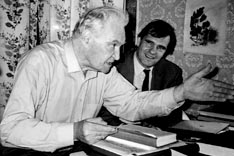
Highlights | Calendar | Music | Books | Concerts | Links | Education | Health
What's New | LaRouche | Spanish Pages | Poetry | Maps
Dialogue of Cultures
Russian Symposium
Honors Pobisk Kuznetsov
May 30-June 1 2002
Moscow, Russia
Some 70 scientists and representatives of scientific, political, and military institutions in Russia attended a May 30-June 1 symposium held in Moscow dedicated to the upcoming second anniversary of the death of Pobisk Kuznetsov, known as "the 20th-Century Russian Leonardo da Vinci." The symposium, on "New Technologies and the Global Challenges for Civilization," continued an organizing and discussion process launched in December 2001, at a memorable Moscow event that was addressed by Lyndon LaRouche and his wife, Helga. Although he could not attend this time, LaRouche's ideas and influence were very much present at the event, both for their crucial importance to the subject under discussion, and because of LaRouche's scientific friendship with Kuznetsov, which has become almost a legend in Russia (click here for background).
 |
||||
|
Pobisk Kuznetsov
|
||||
To open the symposium's deliberations, chairman Yuri Gromyko read a poetic message of greeting from LaRouche (click here for speech), focussing on the axiomatic follies of all the world's leading governments and institutions, and the need for individuals today to assert the same defiantly truthful attitude, as the little boy in "The Emperor's New Clothes." The message elicited a joyful response from the participants, many of whom referred to LaRouche and his work during the presentations and discussion sessions. Copies of a translation of LaRouche's article on "The Legacy of Mendeleyev and Vernadsky: The Spirit of Russia's Science," written for a conference on Vernadsky in November 2001, were distributed to the attendees.
Breakthroughs in Science
The conference presentations covered an extraordinarily wide range of topics of science, education, economics, and politics, all subsumed under Vernadsky's concept of the Noösphere and the life work of Pobisk Kuznetsov. Of particular interest were a number of papers pointing to potentially revolutionary scientific and technological developments, ranging from new forms of nuclear energy, aircraft based on novel aerodynamic principles, high-temperature chemical processes for production of hydrogen, super-high-density biomass production in artificial environments, and the principles of "spontaneous generation" of petroleum and other raw materials by geological processes, to the role of the Golden Section in modern chemistry and quantum physics.
A central topic of discussion was how to organize actual projects, to realize the tremendous untapped potential of already-existing advanced technologies for the development of Russia and the world as a whole. As Yuri Gromyko and others emphasized, that task involves not only the mobilization of resources, but above all a change in people's way of thinking. That point was underlined, in a different way, by Florensky's biting refutation of the dogmas of so-called environmentalism, in his remarks to the symposium.
LaRouche collaborator Jonathan Tennenbaum addressed the event twice: first in the opening session, on the significance of Kuznetsov's personality and work for rebuilding today's devastated world, and on the relationship between the lawful nature of scientific and technological progress as a whole, and the sovereign nature of the individual creative human mind; and later in a provocative presentation on "Kepler versus Newton." The second presentation focussed on the fraud of the inductive-deductive method promoted by Newton in his "Mathematical Principles of Natural Philosophy," as opposed to Kepler's proof of the efficiency of physical principles lying above and beyond the reach of mathematics per se, and reflected in the actual harmonic ordering of the solar system.
Tennenbaum's presentation led, among other things, to a fruitful exchange on the proper use of tensors in physical economy, as opposed to the incompetence of "systems analysis," in measuring the impact of individual human cognition on the economic process as a whole. At issue is the same point that Carl Gauss made in refuting the incompetence of Euler and Lagrange's formalist methods, by demonstrating the physical principle underlying so-called "imaginary numbers."
Gromyko closed the conference, recalling LaRouche's opening greeting and noting that the assembled audience represented a new kind of movement, with special qualifications as well as responsibility to act in the world today.
schiller@schillerinstitute.org
The Schiller Institute
PO BOX 20244
Washington, DC 20041-0244
703-297-8368
Thank you for supporting the Schiller Institute. Your membership and contributions enable us to publish FIDELIO Magazine, and to sponsor concerts, conferences, and other activities which represent critical interventions into the policy making and cultural life of the nation and the world.
Contributions and memberships are not tax-deductible.
VISIT THESE OTHER PAGES:
Home | Search | About | Fidelio | Economy | Strategy | Justice | Conferences | Join
Highlights | Calendar | Music | Books | Concerts | Links | Education | Health
What's New | LaRouche | Spanish Pages | Poetry | Maps
Dialogue of Cultures
© Copyright Schiller Institute, Inc. 2002. All Rights Reserved.